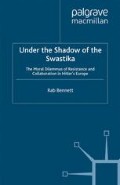Abstract
Throughout Hitler’s Europe people were forced to choose, and to find answers to tragically difficult and unprecedented questions. Jews were often faced with a stark choice between bodily death or spiritual annihilation. The Christian resister confronted the necessity to lie, to deceive, to murder. Officials were faced with the need to violate all professional standards. The occupation years raised profound ethical problems concerning individual responsibility, professional ethics and conflicting duties. Life and death questions. Questions of adherence to pacifist religious principles or saving lives. Questions of patriotism, honour and treason. Questions of political obligation and disobedience: obeying the law or following the dictates of one’s conscience. Questions of utilitarian ethics: choices between a greater or lesser evil. Questions central to the just war tradition which has shaped western attitudes towards violence: when, and under what conditions were killing and violence justified? Questions for every resister to ponder: even if one had a just cause, did one have a right to use any method to defeat Nazism, or were there limits to what was permissible? Disturbing questions concerning the human cost of resistance actions, which jeopardized the lives of one’s fellow countrymen, and whether the price in human suffering was disproportionate to the ends being pursued.
It was one of those rare times when everyone was faced with a moral choice, even though the choice most people made was ‘life as usual’.1
Ted Morgan
The Occupation, by putting people against a wall and forcing them to make the kind of choices that people should perhaps never be asked to make, pushed them into ambiguities … This was a time of heightened sensitivities … Situations that had never seemed in need of questioning now began to be questioned, and new situations arose for which no response had been formulated.2
Frederick Harris
Access this chapter
Tax calculation will be finalised at checkout
Purchases are for personal use only
Preview
Unable to display preview. Download preview PDF.
Notes
T. Morgan, An Uncertain Hour (New York: William Morrow, 1990), P. 67.
E. Harris, Encounters with Darkness (Oxford University Press, 1983), p. 213.
H. Frenay, The Night Will End (London: Coronet, 1977), pp. 99–100.
J. Fest, Hitler (London: Weidenfeld & Nicholson, 1974), p. 963.
Livia E. Bitton Jackson, Elli (London: Granada, 1984), pp. 163–4.
E. Wiesel, Night (Harmondsworth: Penguin, 1987), p. 80.
Emil Fackenheim, ‘The Spectrum of Resistance during the Holocaust’ in Modern Judaism Vol. 2, 1982, p. 124.
D. Bonhoeffer, Letters and Papers from Prison (London: SCM, 1973), pp. 6–7.
In Renate Wind, A Spoke in the Wheel: The Life of Dietrich Bonhoeffer (London: SCM, 1991), p. 81.
J.W. Allen, A History of Political Thought in the XVII Century (London: Methuen, 1957), p. 132.
N. Tec, When Light Pierced the Darkness, Christian Rescue of Jews in Nazi Occupied Poland (Oxford University Press, 1986), p. 64.
Quoted in G. Block & M. Drucker, Rescuers (New York: Holmes & Meier, 1992), pp. 36–7.
A. Miller, ‘Is Everything Permitted’, The Student World, Vol. XXXVIII, Part 4, 1945, p. 288.
W. Bartoszewski, The Warsaw Ghetto: A Christian’s Testimony (London: Lamp Press, 1989), p. 87.
Phillip Hallie, Lest Innocent Blood be Shed (London: Michael Joseph, 1979), pp. 125–6.
In A. Polonsky (ed.), My Brother’s Keeper: Recent Polish Debates on the Holocaust (London: Routledge, 1990), p. 203.
Zui Weigler, ‘Two Polish Villages Razed For Extending Help To Jews’ Yad Vashem Bulletin Part 1, 1957, p. 20.
Interview in H.J. Cargas, Voices from the Holocaust (University Press of Kentucky, 1993), pp. 87–8.
P. De Vomecourt, Who Lived to see the Day: France in Arms 1940–1945 (London: Hutchinson, 1961), pp. 81–2.
W. Niederland, ‘Psychiatric Disorders among Persecution Victims’, Journal of Nervous & Mental Disease (USA), Vol. 139, 1964, p. 468.
Primo Levi, The Drowned and the Saved (London: Michael Joseph, 1988), p. 33.
R. Vrba & A. Bestic, I Cannot Forgive (New York: Bantam, 1964), p. 164.
J. Garlinski, Fighting Auschwitz (London: Julian Friedmann, 1975), p. 139.
J. Presser, Ashes in the Wind: The Destruction of Dutch Jewry (London: Souvenir Press, 1968), p. 108.
R.J. Lifton, The Nazi Doctors (London: Macmillan, 1986), p. 224.
W. Poller, Medical Block Buchenwald (London: Souvenir Press, 1961), P. 97.
O. Lengyel, Five Chimneys (London: Granada, 1983), p. 110.
E. Lingens-Reiner, Prisoners of Fear (London: Gollancz, 1948), pp. 61–2.
S. Nomberg Przytyk, Auschwitz: True Tales from a Grotesque Land (University of North Carolina, 1985), p. 69.
J. Sternberg Newman, In the Hell of Auschwitz (New York: Exposition Press, 1963), pp. 42–3.
A. Blady Szwajger, I Remember Nothing More (London: Collins, 1990), p. 57.
A. Lewin, A Cup of Tears, (London: Fontana, 1990), p. 165.
A. Malraux, Anti Memoirs (London: Hamish Hamilton, 1975), p. 412.
T. Des Pres, The Survivor (Oxford University Press, 1976), pp. 129–30.
L. Langer, ‘The Dilemma of Choice in the Death Camps’, in J.K. Roth & M. Berenbaum (eds), Holocaust: Religious and Philosophical Implications (New York: Paragon House, 1989), p. 224.
See F.W. Deakin, The Embattled Mountain (Oxford University Press, 1971), p. 30. Deakin adds, ‘a child’s cradle has remained in the cave since that day’.
R. Kirschner, Rabbinic Responses of the Holocaust Era (New York: 1980), p. 118.
E. Hillesum, Etty: A Diary 1941–43 (London: Triad Grafton, 1985), p. 191.
Quoted in Nechama Tec, In the Lion’s Den: The Life of Oswald Rufeisen (Oxford University Press, 1990), p. 116. This fascinating book recounts the extraordinary life of Rufeisen in vivid detail, and is thoroughly recommended for its portrait of humane people caught up in an inhumane world.
Author information
Authors and Affiliations
Copyright information
© 1999 Rab Bennett
About this chapter
Cite this chapter
Bennett, R. (1999). Moral Choices in Occupied Europe. In: Under the Shadow of the Swastika. Palgrave Macmillan, London. https://doi.org/10.1057/9780230508262_4
Download citation
DOI: https://doi.org/10.1057/9780230508262_4
Publisher Name: Palgrave Macmillan, London
Print ISBN: 978-1-349-39724-2
Online ISBN: 978-0-230-50826-2
eBook Packages: Palgrave History CollectionHistory (R0)

